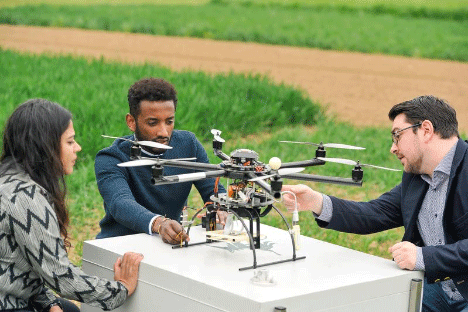In an era where sustainability in agriculture is gaining momentum, the University of Hohenheim, in collaboration with the Julius Kühn Institute (JKI) and the University of Göttingen, is pioneering an innovative approach to farming that could shape the future of global agriculture. The new system, known as NOcsPS (No Chemical-Synthetic Plant Protection Systems), aims to achieve high yields without relying on chemical-synthetic pesticides. This approach, while slightly less productive than conventional methods, has the potential to significantly benefit the environment and biodiversity.
The NOcsPS system replaces chemical pesticides with advanced robotics, artificial intelligence, and technologies that adhere to biological principles. By using mineral fertilizers for targeted nitrogen supplementation, NOcsPS maintains crop health and productivity. Since its inception in 2019, large-scale field trials at two sites in Germany—Hohenheim in Baden-Württemberg and Dahnsdorf in Brandenburg—have shown promising results.
At Hohenheim, NOcsPS wheat yields were only 4-12% lower than those of conventional systems, a minor drop compared to the 23-24% reduction observed at the Dahnsdorf site. The difference in yield was largely due to the availability of water and nutrients at each location, highlighting how local conditions can influence the performance of these innovative systems. Despite the yield gap, NOcsPS consistently outperformed organic farming methods, which often struggled with nitrogen deficiency.
Other crops, such as barley, triticale, and rye, demonstrated similar results, with NOcsPS yields sitting between those of conventional and organic systems. However, legumes like soybeans and peas performed less consistently, achieving better results than organic systems but falling short of conventional yields. Remarkably, maize under the NOcsPS system produced stable yields comparable to conventional systems, indicating the adaptability of the method across different crop types.
A key element of the NOcsPS system is its reliance on modernized mechanical weed control, utilizing intelligent hoeing and harrowing technologies. These tools are equipped with automated, digitalized systems that can distinguish between crops and weeds, sparing protected species that play a vital role in maintaining biodiversity. This approach to weed management, combined with a modified crop rotation strategy incorporating both winter and summer crops, contributes to improved soil health and humus development.
The NOcsPS project also addresses the economic feasibility of these systems. Initial findings suggest that while NOcsPS yields fall between conventional and organic farming, the market price for products from these systems may similarly occupy a middle ground. Consumer surveys indicate that many people are willing to pay a premium for products grown without chemical-synthetic pesticides, reflecting a growing demand for sustainable agricultural practices.
In addition to supporting biodiversity, the NOcsPS trials have shown positive effects on insect diversity at both test sites. Future plans for the project include expanding trials to more challenging crops like rapeseed, sugar beets, and potatoes to further evaluate the system’s versatility and effectiveness.
The University of Hohenheim’s NOcsPS project is a bold step toward more sustainable farming practices that balance yield with environmental stewardship. Early trials suggest that this chemical-free approach can achieve competitive yields while enhancing biodiversity and soil health. As the project expands to include more complex crops, it holds the promise of transforming the future of agriculture by providing a viable alternative to conventional farming systems.
Error




